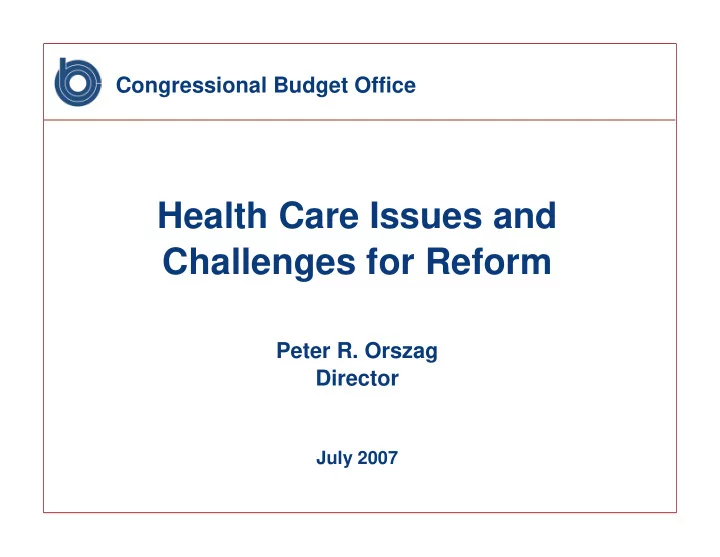

Congressional Budget Office Health Care Issues and Challenges for Reform Peter R. Orszag Director July 2007
Total Federal Spending for Medicare and Medicaid Under Assumptions About the Health Cost Growth Differential Percent of Gross Domestic Product 25 Actual Baseline Projection Differential of: 2.5 Percentage Points 20 1 Percentage Point Zero 15 10 5 0 1966 1972 1978 1984 1990 1996 2002 2008 2014 2020 2026 2032 2038 2044 2050
Excess Cost Growth in National Health Expenditures Percentage-Point Difference from per Capita GDP Growth 8 Actual Projected 7 6 5 4 Ten-Year Moving 3 Average 2 1 0 -1 -2 1961 1966 1971 1976 1981 1986 1991 1996 2001 2006 2011 2016 Source: Based on data and projections from CMS.
Annual Growth Rates of Private and Public Health Care Spending Change in Total Nominal Spending from Previous Year 20 Public 18 16 14 12 10 8 6 4 2 Private 0 1970 1973 1976 1979 1982 1985 1988 1991 1994 1997 2000 2003 Source: CMS’s data on national health expenditures.
National Health Expenditures, by Source of Funds, 2005 Billions of Dollars Private Funds: 1,085.0 Public Funds: 902.7 Federal Consumers' Payments for Spending Private Health Insurance (643.9) (694.4) State and Local Consumers' Governments' Out-of-Pocket Spending Other Payments (258.8) Private (249.4) Funds (141.2) Source: Data from CMS.
National Health Expenditures, 2006 Billions of Dollars Public Medical Health Products Activities (61.5) (61.7) Investment Program Administration and (134.8) Private Health Insurance (156.8) Services by Physicians and Others (662.8) Nursing Home and Home Health Services (179.4) Prescription Drugs (213.7) Hospital Care (651.8) Source: Data from CMS and the Department of Commerce.
Effects of Slowing the Growth of Spending for Medicare and Medicaid Percent of Gross Domestic Product 25 Actual Projection Differential of: 20 2.5 Percentage Points 1 Percentage Point Beginning in 2025 15 1 Percentage Point Beginning in 2015 10 5 0 1966 1972 1978 1984 1990 1996 2002 2008 2014 2020 2026 2032 2038 2044 2050
Medicare Spending per Capita in the United States, by Hospital Referral Region, 2003 $7,000 to to 11,352 11,352 (63) (63) $7,000 6,500 to < to < 7,000 7,000 (53) (53) 6,500 6,000 to < to < 6,500 6,500 (56) (56) 6,000 5,500 to < 5,500 to < 6,000 6,000 (64) (64) 4,272 to < 4,272 to < 5,500 5,500 (70) (70) Not Populated Not Populated Source: www.dartmouthatlas.org Source: Dartmouth Atlas of Health Care.
The Relationship Between Quality and Medicare Spending, by State, 2004 Composite Measure of Quality of Care 88 83 78 73 4,000 5,000 6,000 7,000 8,000 Spending (Dollars) Source: Data from AHRQ and CMS.
Share of Personal Health Care Expenditures Paid Out of Pocket Percent 35 33% 30 25 26% 20 15 17% 15% 13% 10 5 0 1975 1985 1995 2005 2015
RAND’s Experiment on Health Insurance � Compared spending and health under various insurance designs � Found that initial cost sharing could have substantial effects on total spending � Cost sharing reduced both effective and ineffective care about equally � Design of plan had no impact on health for most enrollees; some benefit of free care for low-income enrollees in the poorest health
Effects of Cost Sharing Dollars per Enrollee 3,500 3,440 3,000 2,500 26% 2,000 2,228 2,116 1,500 15% 1,000 500 0 Free-Care Plan Conventional Plan High-Deductible Plan ($400 deductible, 25% ($4,000 deductible coinsurance, $4,000 limit) and limit) Source: Based on data from RAND’s health insurance experiment.
Concentration of Total Annual Medicare Expenditures Among Beneficiaries, 2001 Percent 100 5 5 90 15 80 43.1 70 25 60 50 18.4 40 30 23.5 50 20 10 11.2 3.8 0 Beneficiaries Expenditures Source: CBO based on data from CMS.
Recommend
More recommend